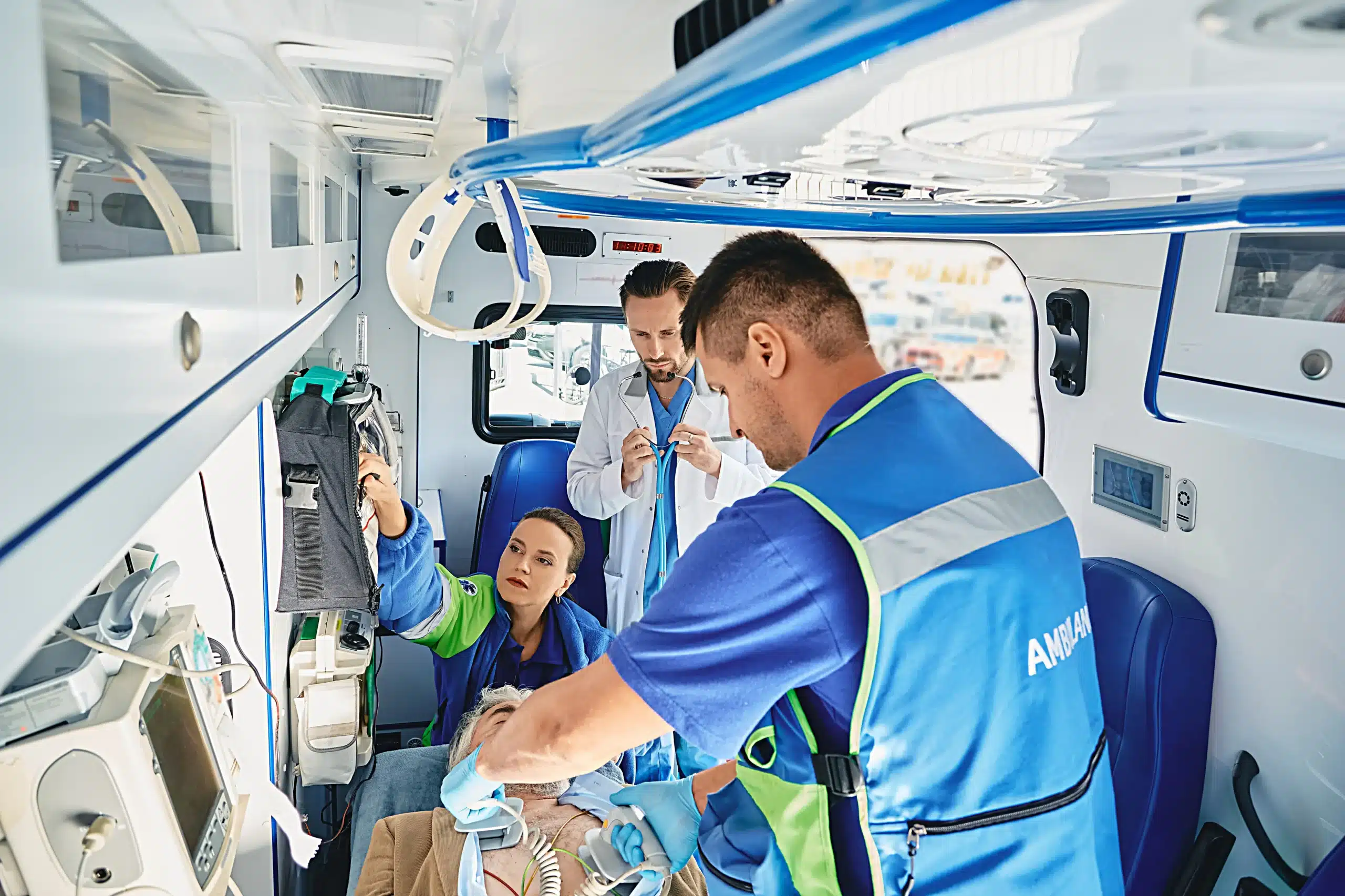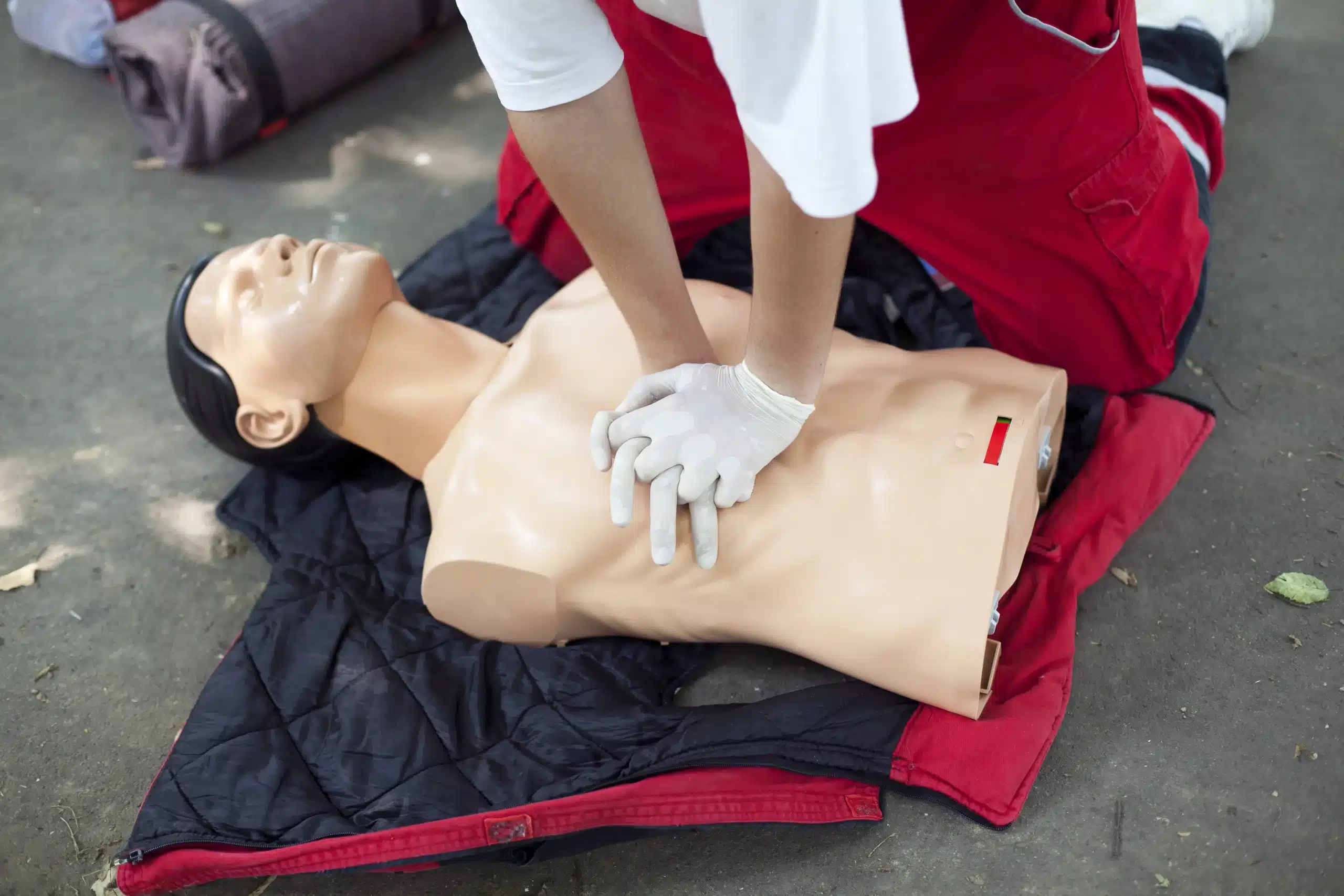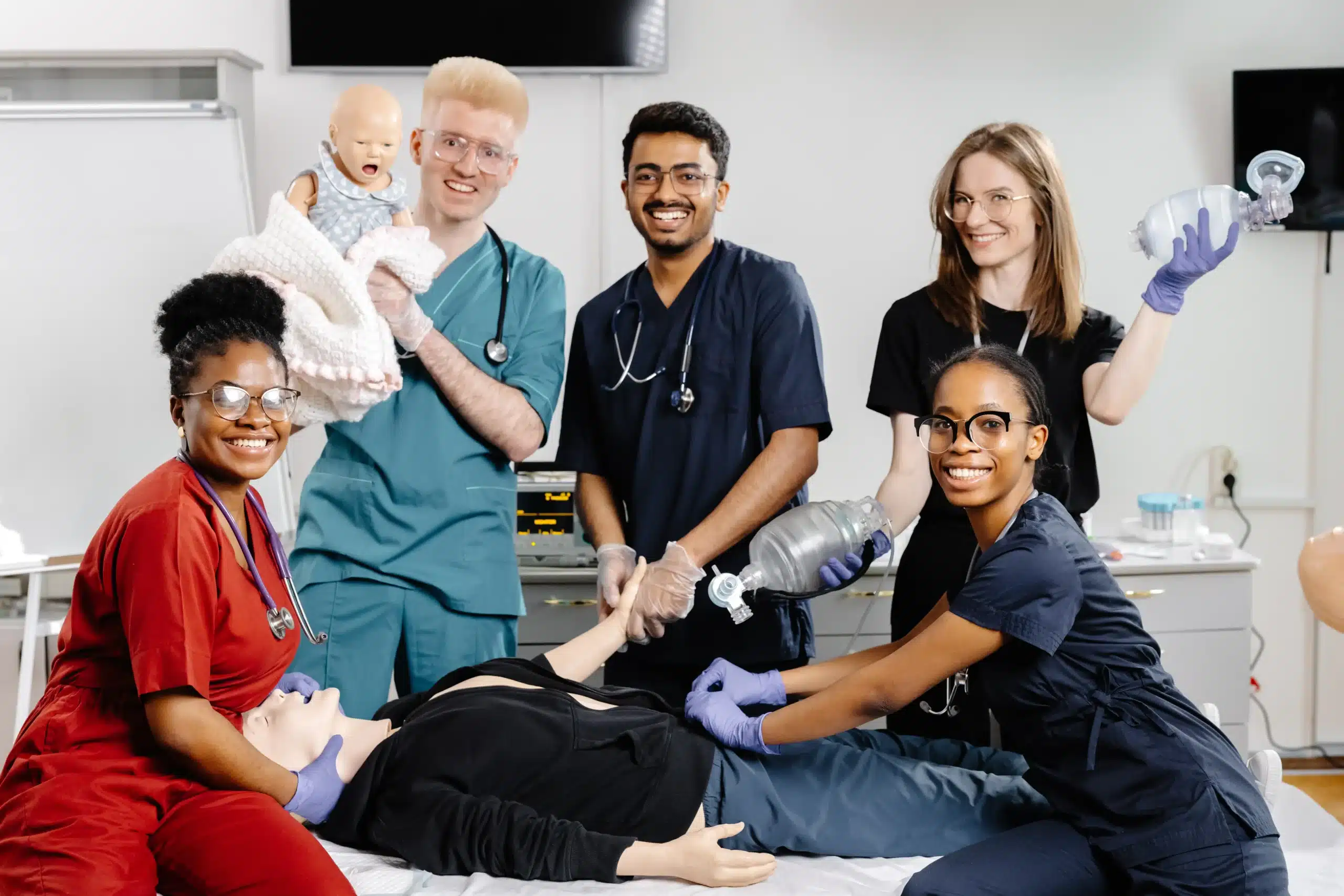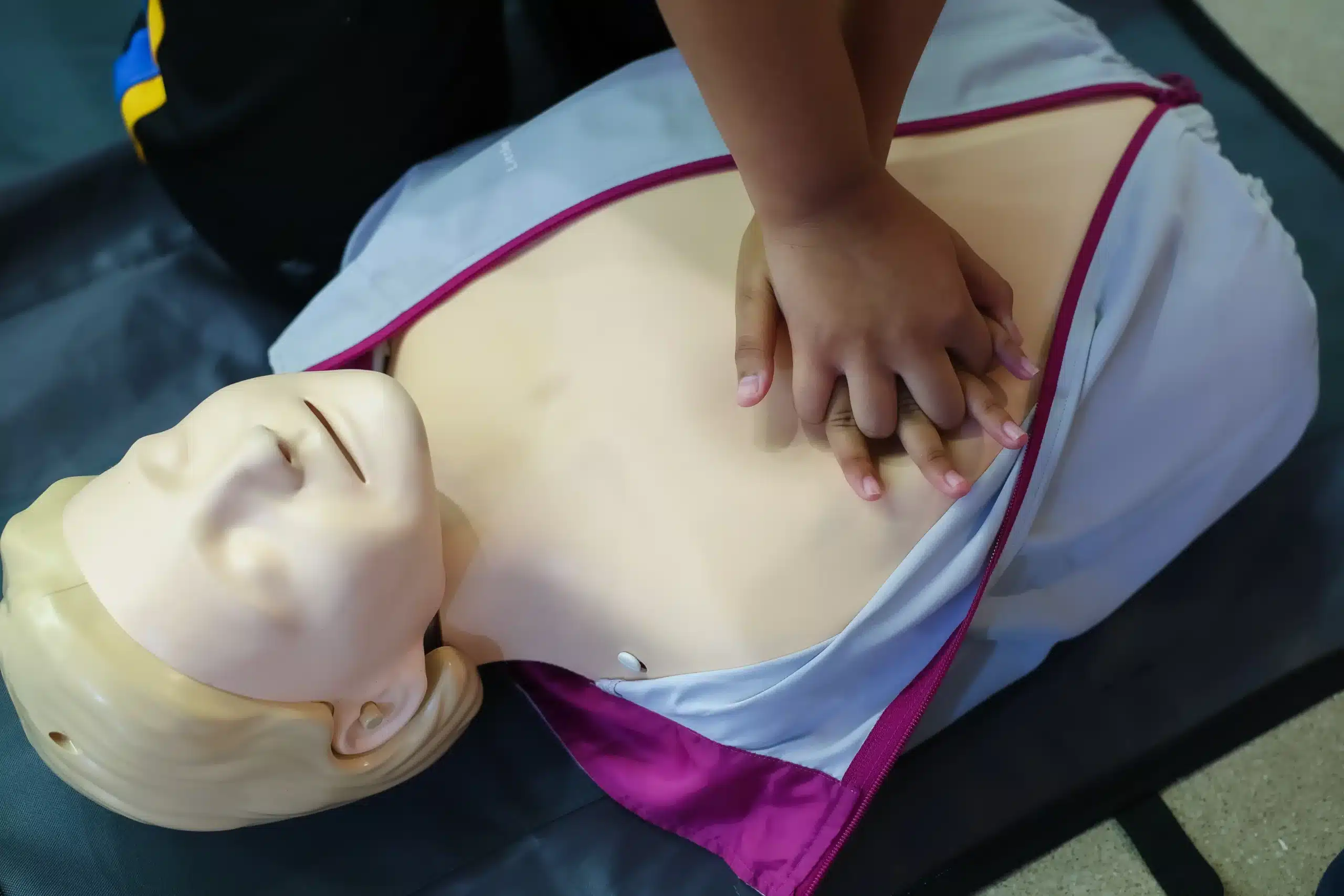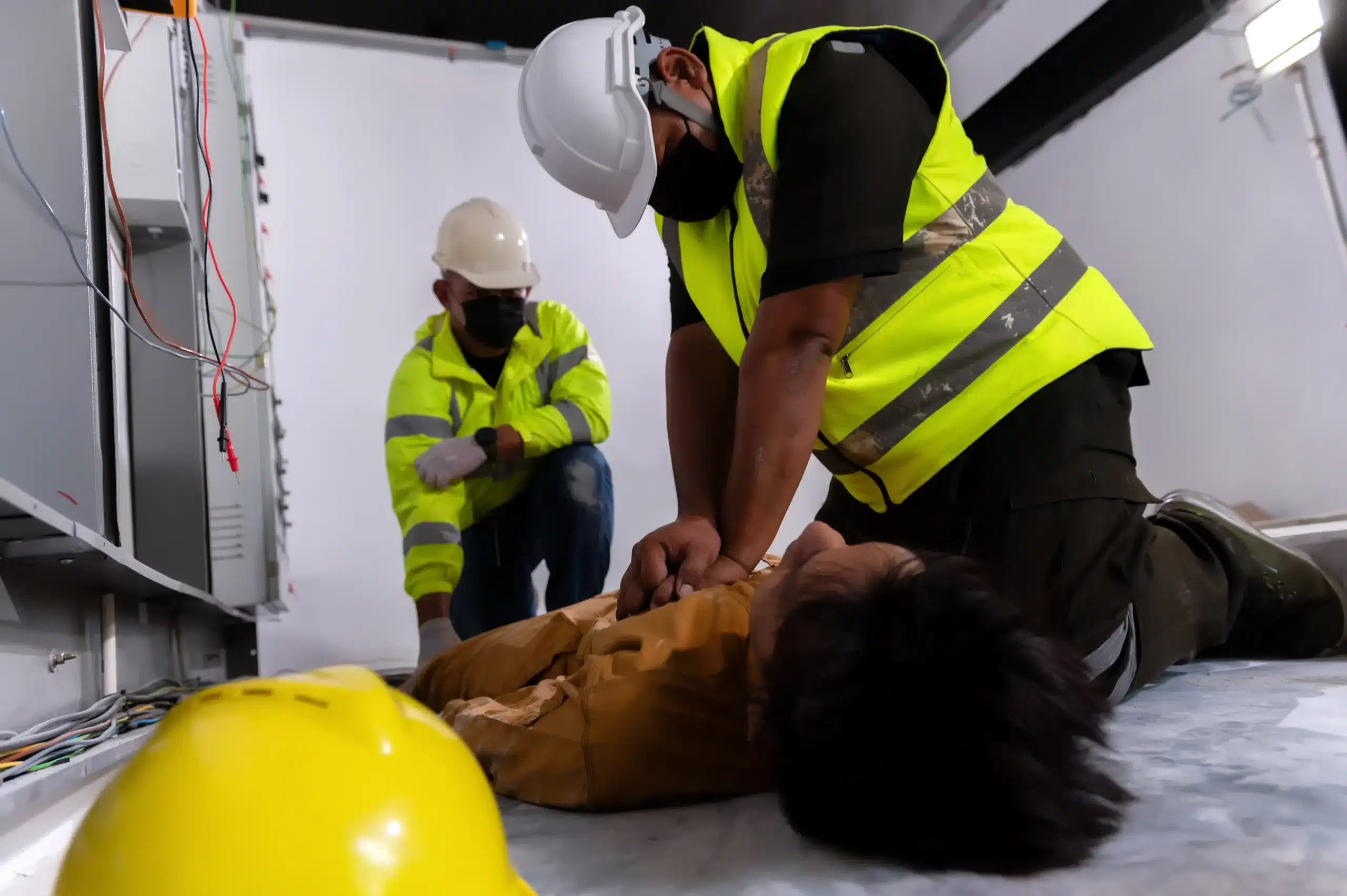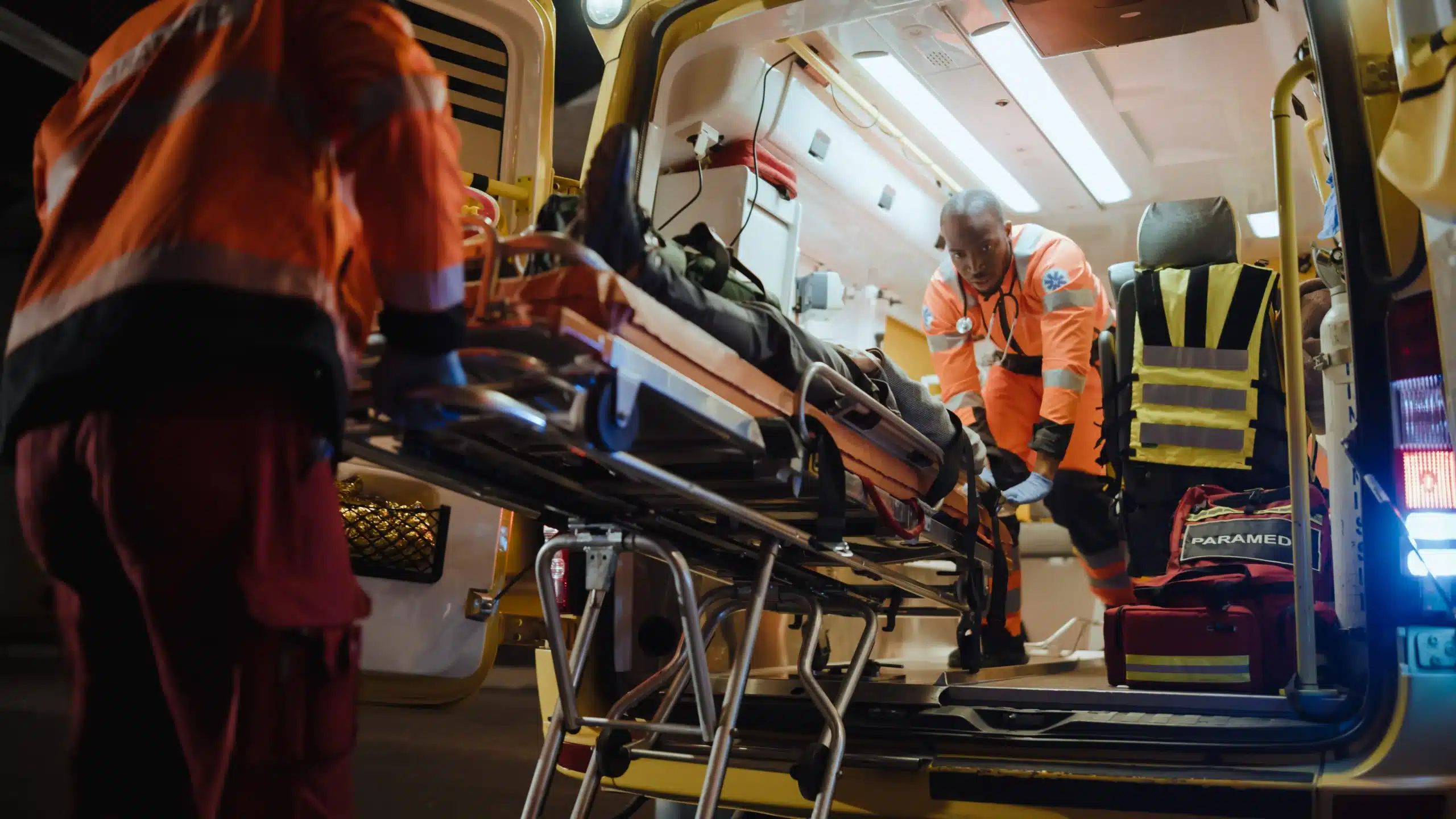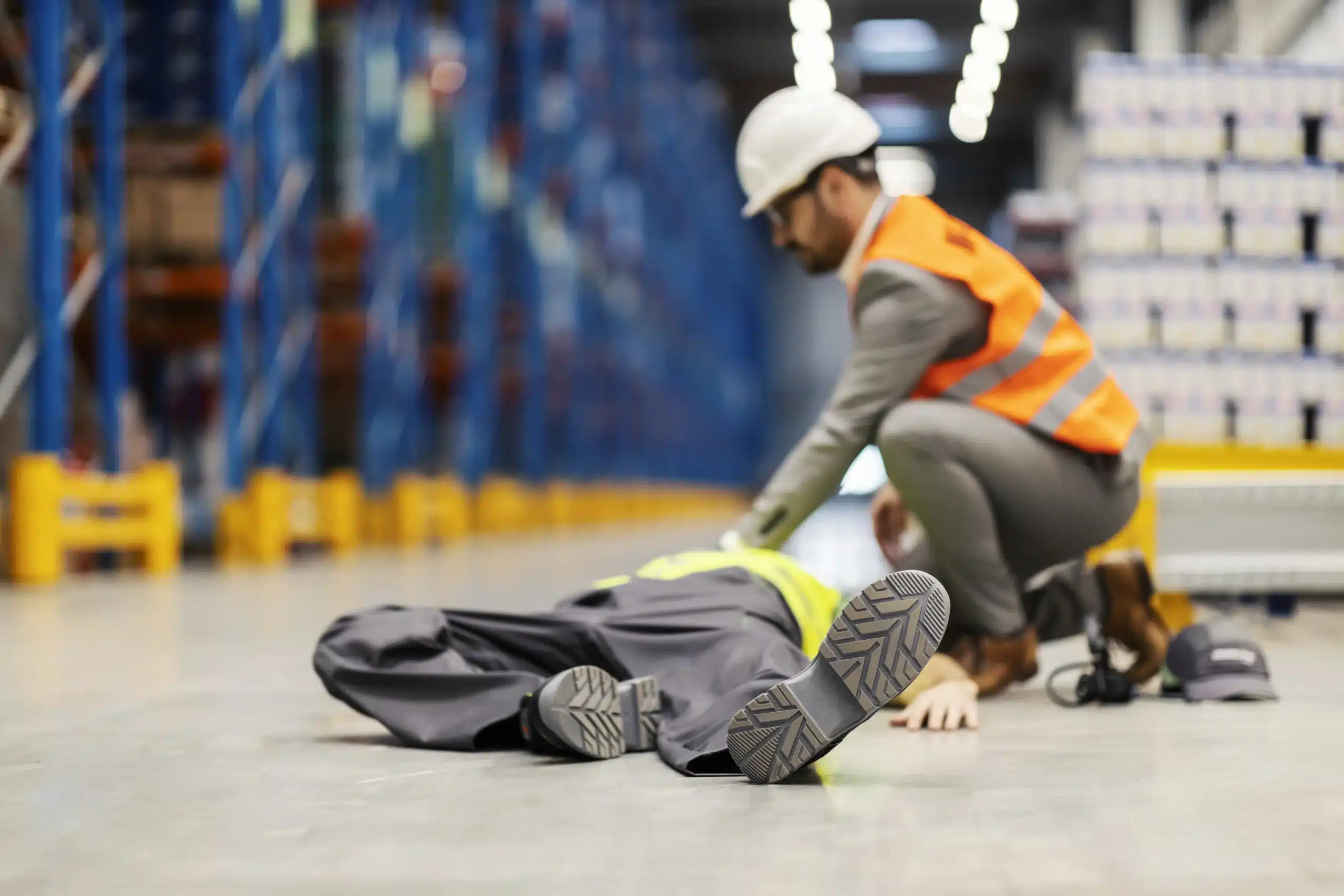Learning CPR is more than just a good idea—it’s a powerful skill that can save lives. If you’re in Visalia and searching for the right CPR training, this guide will help you every step of the way. We’ll explore the different types of CPR classes in Visalia, including BLS, Heartsaver CPR, and First Aid, and help you determine which certification best suits your needs. We’ll also discuss the benefits of hands-on training, the importance of choosing an American Heart Association-certified instructor, and how to find affordable CPR classes in your area. Plus, we’ll provide valuable insights into what to expect during a CPR class and how to maintain your certification. Whether you’re a healthcare professional, a parent, or simply someone who wants to be prepared for emergencies, this guide will empower you to find the perfect CPR class in Visalia.
Key Takeaways
- CPR skills empower everyone: Whether you’re a healthcare professional, a parent, or just someone who wants to be prepared, CPR training equips you to make a real difference in emergencies. Explore the various levels of certification available and find the right fit for your needs.
- Finding the right CPR class is easy: Visalia offers a range of CPR classes to fit your schedule and budget, including daily classes, blended learning, and group discounts. Consider factors like instructor qualifications and course content to choose the best option.
- Maintain your CPR skills for long-term preparedness: CPR certification is typically valid for two years. Stay current with the latest guidelines by renewing your certification and taking advantage of continuing education opportunities. This ensures you’re always ready to respond effectively.
What is CPR and Why is it Important?
CPR (Cardiopulmonary Resuscitation) is a life-saving technique used in emergencies. It combines chest compressions and rescue breaths to circulate oxygenated blood and maintain a heartbeat until professional medical help arrives. Learning CPR empowers you to respond effectively during critical situations like heart attacks, near-drowning incidents, or choking emergencies, significantly improving the chances of survival. For a deeper understanding of CPR and its relation to BLS, take a look at this article. CPR helps bridge the critical gap before paramedics arrive, increasing the likelihood of a positive outcome.
Common CPR Misconceptions
Several misunderstandings about CPR can prevent people from seeking training. One myth is that CPR alone can restart a stopped heart. While CPR maintains vital blood flow and oxygenation, it’s the defibrillation or advanced medical care that typically restarts the heart. Another misconception is that CPR always revives someone in cardiac arrest. CPR significantly increases survival odds, but various factors influence the outcome. Some hesitate to learn CPR due to fears of performing it incorrectly or causing injury. However, even basic CPR can be life-saving, and quality training addresses these concerns, building confidence and competence.
CPR Benefits for You and Your Community
Learning CPR offers numerous personal and community benefits. It equips you with the skills and confidence to respond effectively in emergencies, potentially saving a life. CPR and First Aid training provides the knowledge and practice necessary to handle various emergency situations. Group CPR classes offer a supportive learning environment and can be a great way to learn this vital skill alongside others. By becoming CPR certified, you contribute to a more prepared and resilient community, ready to respond to emergencies effectively.
CPR Classes in Visalia: What’s Available?
Finding the right CPR class can feel overwhelming with so many options. This section breaks down the different types of CPR certification courses available in Visalia, so you can choose the best fit for your needs.
Basic Life Support (BLS)
BLS certification is the cornerstone for healthcare providers and anyone working in a medical setting. It covers core life-saving skills for adults, children, and infants, including CPR, AED use, and how to relieve choking. BLS classes emphasize high-quality CPR, teamwork, and effective communication during emergencies. If you’re pursuing a career in healthcare or already working in the field, BLS certification is essential. Check out the BLS course options in Visalia to get started. It’s also a valuable asset for other professions like lifeguarding, personal training, or coaching.
Heartsaver CPR
Heartsaver CPR courses are designed for those who don’t work in healthcare but still want to learn essential life-saving skills. This course teaches CPR and how to use an AED for adults, children, and infants. It also covers how to respond to choking incidents. It’s ideal for teachers, childcare providers, parents, and anyone who wants to be prepared for an emergency. While not as comprehensive as BLS, Heartsaver CPR provides valuable skills that can make a real difference. Contact Safety Training Seminars to learn more about Heartsaver courses in Visalia.
First Aid Training
First aid training equips you with the knowledge and skills to handle a wide range of medical emergencies, from minor cuts and burns to more serious injuries like fractures and allergic reactions. You’ll learn how to assess injuries, control bleeding, manage shock, and administer basic wound care. First aid certification is a valuable addition to any CPR course and is often included as part of the curriculum. It’s a smart choice for anyone who wants to be prepared for everyday emergencies, whether at home, work, or out in the community. Learn more about how first aid training can benefit you.
Pediatric CPR
Pediatric CPR focuses specifically on providing life-saving care to infants and children. This course teaches CPR techniques tailored to the smaller airways and bodies of young children, as well as how to respond to choking incidents. Pediatric CPR training is crucial for parents, grandparents, childcare providers, teachers, and anyone who regularly interacts with children. It provides the specialized skills and confidence needed to respond effectively in a pediatric emergency. Explore CPR and first aid classes in Visalia, including those with a focus on pediatric care.
Advanced Cardiac Life Support (ACLS)
ACLS certification is an advanced level of training designed for healthcare professionals who manage life-threatening cardiovascular emergencies. Building upon the foundation of BLS, ACLS courses cover topics like airway management, rhythm recognition, and pharmacological interventions. This certification is typically required for doctors, nurses, paramedics, and other healthcare providers working in critical care settings. ACLS training ensures they have the advanced skills and knowledge to provide comprehensive care during complex medical emergencies. Contact CPR Visalia for more information on ACLS certification.
Top CPR Class Providers in Visalia
Finding the right CPR class is crucial. Here’s a rundown of reputable providers in Visalia:
Safety Training Seminars
Safety Training Seminars, a woman-owned AHA Training Center, offers various American Heart Association courses, including BLS, ACLS, PALS, CPR, and First Aid. They prioritize excellent customer service and offer the lowest prices in Tulare County, backed by a Low Price Guarantee. With daily classes available, they make CPR certification convenient and accessible. They serve Visalia, Tulare, and Delano. You can find their BLS course information here. They also offer RQI classes, which you can learn more about here. Need to get in touch? Contact them to learn more.
Visalia CPR
Visalia CPR is another authorized American Heart Association training center specializing in CPR and first aid training. They offer courses such as Basic Life Support (BLS), Heartsaver CPR AED, First Aid, and Bloodborne Pathogens training. Their focus on high-quality instruction prepares participants for various emergency situations.
Southern’s CPR & First Aid Training
Southern’s CPR & First Aid Training provides comprehensive first aid and CPR training for individuals and businesses. As an American Heart Association Authorized Training Center, they offer classes seven days a week, providing flexibility for certification. Their courses cater to both healthcare professionals and the general public.
College of Sequoias
The College of Sequoias offers Basic Life Support (BLS) CPR classes leading to American Heart Association certification. These classes are valuable for many healthcare jobs, equipping participants with essential emergency response skills.
Kaweah Health
Kaweah Health engages the community by offering free Hands-Only CPR training events. These sessions teach community members effective life-saving techniques, highlighting the importance of CPR knowledge.
What Happens in a CPR Class?
So, you’ve decided to take a CPR class—fantastic! Knowing what to expect can help you feel prepared and ready to learn. Here’s a look at what a typical CPR class entails:
Course Length and Format
CPR classes combine instruction with hands-on practice. They usually begin with an overview of basic emergency response. Think of it as understanding the reasons behind the actions. Safety Training Seminars offers flexible scheduling, including on-site training, so you can easily find a class that fits your schedule. The length of your class will depend on the type of CPR certification you’re going for. A combined CPR and First Aid course might last a few hours, while a more advanced certification like ACLS could take a full day.
Hands-on Practice and Equipment
Learning CPR is more than just lectures and videos. You’ll spend a good portion of your class practicing on training mannequins. This hands-on training helps you become comfortable performing chest compressions and giving rescue breaths. You’ll learn the correct hand placement, how deep your compressions should be, and how to recognize and respond to various emergency situations. This practical experience builds your muscle memory and confidence, preparing you to act quickly and effectively under pressure. You’ll also likely learn how to use an AED (automated external defibrillator).
Certification: How it Works
Once you’ve successfully completed the course and skills testing, you’ll receive your official CPR certification card. The American Heart Association offers a variety of certification programs, including the popular RQI (Resuscitation Quality Improvement) program. These certifications are usually valid for two years. It’s important to keep your certification up-to-date, so be sure to register for a renewal course before it expires. This ensures your skills remain sharp and you’re always ready to respond to an emergency.
CPR Class Costs & Value in Visalia
Knowing the price range for CPR classes helps you budget and find the best value. This section breaks down typical costs in Visalia and highlights ways to save.
Typical Prices and What They Include
CPR class costs in Visalia depend on the type of course and the training center. Basic CPR classes typically start around $70, while more advanced certifications like ACLS are more expensive. It’s important to understand what’s included in the price. Look for courses that bundle study materials, certification fees, and any necessary equipment rentals into one upfront cost. This will help you avoid unexpected expenses. For a comprehensive guide to CPR training costs in Visalia, check out this helpful resource.
Group Discounts and Deals
If you’re training with a group, ask about discounts. Many providers, including Safety Training Seminars, offer reduced rates for group bookings. This can be a great option for workplaces, community organizations, or even groups of friends. Group training not only saves money but also creates a supportive learning environment. Learn more about group discounts for CPR training in Visalia.
Safety Training Seminars’ Low Price Guarantee
Safety Training Seminars offers a low price guarantee on their CPR classes. As a woman-owned American Heart Association Training Center, they prioritize both quality instruction and affordability. Their commitment to offering the lowest prices in Tulare County makes them a smart choice for budget-conscious individuals and groups. You can learn more about their low price guarantee on their website.
Class Schedules and Accessibility
Finding a CPR class that fits your schedule shouldn’t be a hurdle. Thankfully, several options are designed to accommodate various needs and preferences, from daily classes to online learning. Let’s explore what’s available.
Daily Classes
Juggling work, family, and other commitments can make it tough to squeeze in extra training. Safety Training Seminars understands this and offers CPR classes in Visalia, CA seven days a week. This frequent scheduling increases your chances of finding a class time that works for you, whether it’s a weekday evening or a weekend slot. They also offer on-site training, bringing the instruction directly to your workplace or group.
Online and Blended Learning
For those who prefer a more flexible approach, online and blended learning options are becoming increasingly popular. The American Heart Association’s RQI program is a prime example. This program combines online coursework with in-person skills sessions, allowing you to learn the material at your own pace and then demonstrate your skills with a certified instructor. This blended approach offers the convenience of online learning with the essential hands-on practice component.
Bilingual Instruction
It’s crucial that life-saving skills are accessible to everyone, regardless of language. Many CPR training providers in Visalia recognize this and offer classes in both English and Spanish. This inclusivity ensures that more people can receive the training they need to respond to emergencies confidently. Check with specific training centers to confirm language options and availability.
Instructor Qualifications and Standards
When choosing a CPR class, the instructor’s qualifications are just as important as the curriculum. You want to learn from someone knowledgeable, experienced, and up-to-date on the latest emergency care guidelines. Here’s what to look for in a qualified CPR instructor:
American Heart Association Certification
A key indicator of quality is American Heart Association (AHA) certification. CPR Visalia is an authorized AHA Training Center, meaning our instructors meet the rigorous standards set by the AHA. This ensures you’re learning the most current and effective CPR techniques. AHA certification also means the training center follows specific guidelines for course content, equipment, and instructor qualifications, providing a consistent and high-quality learning experience.
Healthcare Experience
While not always a requirement, real-world healthcare experience adds significant value to CPR instruction. Instructors with a background in healthcare often have a deeper understanding of how these skills apply in real-life emergencies. They can offer practical insights and answer your questions from a place of experience, making the training more relevant and engaging.
Ongoing Training
The healthcare field is constantly evolving, so it’s essential for CPR instructors to stay current. Look for training centers, like CPR Visalia, that prioritize ongoing training for their instructors. This ensures they’re always teaching the latest guidelines and techniques, giving you the most up-to-date and effective training possible. This commitment to continuing education demonstrates a dedication to providing high-quality instruction and the best possible learning outcomes.
Find the Right CPR Class
Choosing the right CPR class depends on your specific needs. Whether you’re a healthcare provider, work in childcare, or simply want to learn CPR for personal knowledge, Visalia offers a variety of options. Let’s break down the best fit for you:
Healthcare Professionals
For healthcare professionals like doctors, nurses, and EMTs, maintaining current CPR certification is essential. CPR Visalia, an authorized American Heart Association (AHA) Training Center, offers several certification courses, including BLS, ACLS, PALS, and First Aid. These courses blend classroom learning with hands-on practice, giving you the skills and confidence to respond effectively in emergencies. You’ll learn the latest techniques and guidelines to provide the highest quality of care. Check out the available BLS courses in Visalia. For those needing to renew their BLS skills quickly, consider the streamlined RQI classes also offered.
Childcare Providers
Working with children means being prepared for anything. CPR and First Aid certification are often required for childcare providers, and thankfully, there are flexible options to fit your busy schedule. Many providers offer weekend and evening classes, making it easier to get certified. Be sure to choose a class that aligns with licensing requirements in your area. Contact your local community college or training center for more information on CPR classes for childcare providers.
General Public and Workplace Needs
Learning CPR can make a real difference in your community and workplace. Even without a medical background, you can learn the skills to save a life. Group CPR training is a great option for families, community groups, and businesses looking to improve their emergency preparedness. These classes create a supportive learning environment and can often be more affordable. Consider organizing a group class with your neighbors or colleagues – it’s a valuable investment in your community’s safety. Contact CPR Visalia to learn more about their Low Price Guarantee and find a class that works for you. Reach them through their contact page.
CPR Training and Technology
Technology plays a significant role in modern CPR training, offering innovative ways to learn and practice lifesaving skills. From interactive apps to online resources, these tools enhance the learning experience and make staying up-to-date with the latest guidelines more convenient than ever. Let’s explore how technology is transforming CPR education.
Apps and Virtual Simulations
Think of CPR apps and virtual simulations as your personal training ground. These tools create interactive environments where you can practice CPR techniques at your own pace. Many apps offer step-by-step instructions, feedback on your compressions and breaths, and realistic scenarios to test your decision-making. The American Heart Association’s RQI program is a great example of how virtual simulations are used to help healthcare professionals maintain their BLS, ACLS, and PALS certifications. This type of training offers a fast and efficient path to maintaining certification, especially for busy professionals.
Online Resources for Continued Learning
Beyond initial certification, staying current with the latest CPR guidelines is crucial for effective response in real-life emergencies. Online resources offer a convenient way to refresh your skills and knowledge. Online CPR training courses and refresher materials can help you maintain your proficiency, even with a demanding schedule. These resources are invaluable for ensuring you’re always prepared to provide assistance when needed.
Keep Your CPR Certification Current
Knowing CPR can give you the confidence to respond effectively during emergencies. But guidelines and best practices change, so staying up-to-date on the latest techniques is crucial. That’s why keeping your CPR certification current is so important. It’s not just about having a valid card—it’s about being truly prepared to help when it matters most.
Renew Your Certification
CPR certifications are typically valid for two years. As your expiration date approaches, it’s essential to renew your credentials. Renewal courses are often shorter than initial certification classes, focusing on refreshing your skills and knowledge. They cover any updates to the guidelines, ensuring you’re equipped with the most current recommendations. At Safety Training Seminars, convenient CPR renewal courses are designed to fit your busy schedule, making maintaining your certification easy.
Continuing Education
Beyond renewing your certification, ongoing education can significantly enhance your CPR skills. Staying informed about the latest advancements in resuscitation techniques can improve your confidence and effectiveness in real-life situations. Look for opportunities to expand your knowledge through workshops, online resources, and refresher courses. For healthcare professionals in Visalia, the American Heart Association’s RQI program offers a modern and efficient way to maintain your BLS, ACLS, and PALS certifications. This program emphasizes continuous quality improvement, ensuring you’re always prepared to provide the highest standard of care. By committing to continuing education, you not only maintain your skills but also contribute to a culture of preparedness in your community.
Related Articles
- Why CPR is Important in Healthcare – Visalia CPR Classes
- Debunking Common CPR Myths
- CPR Training in Visalia: Your Complete Guide – Visalia CPR Classes
- The Science Behind Effective CPR – Visalia CPR Classes
- RQI in Concord: Your Guide to CPR Training – Visalia CPR Classes
Frequently Asked Questions
What’s the difference between BLS and Heartsaver CPR?
BLS (Basic Life Support) certification is more comprehensive and geared towards healthcare providers, covering CPR for adults, children, and infants, AED use, and choking relief. It emphasizes teamwork and communication in medical settings. Heartsaver CPR is designed for the general public and also covers CPR and AED use for all ages, plus choking relief, but doesn’t delve into the team dynamics or advanced techniques found in BLS.
How often do I need to renew my CPR certification?
CPR certifications are typically valid for two years. It’s a good idea to sign up for a renewal course a few weeks before your current certification expires to avoid any gaps in your credentials.
What if I’m nervous about performing CPR in a real emergency?
It’s completely normal to feel apprehensive, but quality CPR training builds confidence through hands-on practice and realistic scenarios. You’ll learn the proper techniques and gain the muscle memory needed to respond effectively under pressure. Plus, remember that any attempt at CPR is better than none.
Are there online CPR classes available?
Yes, online and blended learning options are available, often combining online coursework with in-person skills sessions. This allows for flexible learning at your own pace, followed by hands-on practice and evaluation with a certified instructor.
How can I find a reputable CPR training provider in Visalia?
Look for training centers that are authorized by the American Heart Association. This ensures the instructors meet specific qualifications and the curriculum adheres to the latest guidelines. Reading reviews and comparing prices can also help you find a provider that fits your needs and budget. Safety Training Seminars, for example, is a woman-owned AHA Training Center known for its low prices and excellent customer service.
